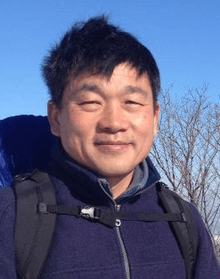Choe Sang-hun

Choe Sang-Hun (Korean: 최상훈, born 1962) is a Pulitzer Prize-winning South Korean journalist.[1]
Early life
Choe was born in Ulju-gun, Ulsan in southern South Korea. He received a B.A. in Economics from Yeungnam University and a master's degree in interpretation and translation from the Hankuk University of Foreign Studies in Seoul.[2]
Career
Choe began his journalism career as a political reporter at The Korea Herald, an English-language daily. He joined the Associated Press' Seoul Bureau in 1994.[2] While a correspondent there he won the 2000 Pulitzer Prize for Investigative Reporting for bringing to light the decades-old No Gun Ri Massacre.[3] He was the first Korean to receive a Pulitzer Prize.[4] He moved to the International New York Times [formerly International Herald Tribune] in 2005.
In 2010, he was named as the 2010–2011 academic year Koret Fellow in the Korean Studies Program at the Walter H. Shorenstein Asia-Pacific Research Center, part of Stanford University's Freeman Spogli Institute for International Studies.[5]
Selected works
- Hanley, Charles J.; Choe, Sang-Hun; Mendoza, Martha (2001), The Bridge at No Gun Ri: a hidden nightmare from the Korean War, New York: Henry Holt and Co., ISBN 978-0-8050-6658-6, OCLC 46872329
- Kirk, Donald; Choe, Sang-Hun (2006), Korea Witness: 135 years of war, crisis and news in the land of the morning calm, Seoul: Eunhaeng Namu, ISBN 978-89-5660-155-7, OCLC 708318187
- Choe, Sang-Hun; Torchia, Christopher (2006), Looking for Mr. Kim in Seoul: a guide to Korean expressions, New York: Infini Press, ISBN 978-1-932457-03-2, OCLC 123193849
References
- ↑ 권은중 (1999-10-14), "인터뷰: 노근리사건 보도 최상훈 AP통신 서울지국 기자 — Interview: AP Seoul correspondent Choe Sang-Hun, who reported on the No Gun Ri Incident", Media Today, retrieved 2011-07-25
- ↑ 2.0 2.1 "Biography: Sang-Hun Choe, Charles J. Hanley and Martha Mendoza", The 2000 Pulitzer Prize Winners: Investigative Reporting, retrieved 2011-07-25
- ↑ 우상표 (2000-04-22), "AP 최상훈기자 퓰리처상 수상 — AP reporter Choe Sang-Hun awarded Pulitzer Prize", Yongin Simin Sinmun, retrieved 2011-07-25
- ↑ "2000 Pulitzer Prize Winner "Investigative Reporting"", Pulitzer Prize, retrieved 2013-09-09
- ↑ Sang-Hun Choe named Korean Studies Program’s Koret Fellow, Stanford University, 2010-08-12, retrieved 2011-07-25
External links
- Home page at the Freeman Spogli Institute for International Studies
- Author index at The New York Times